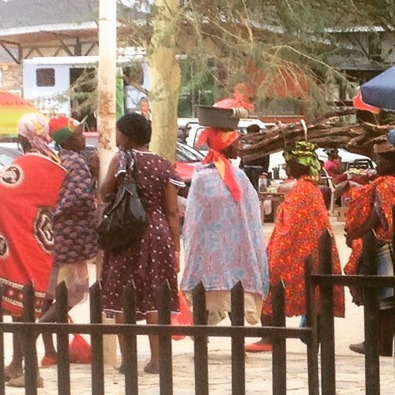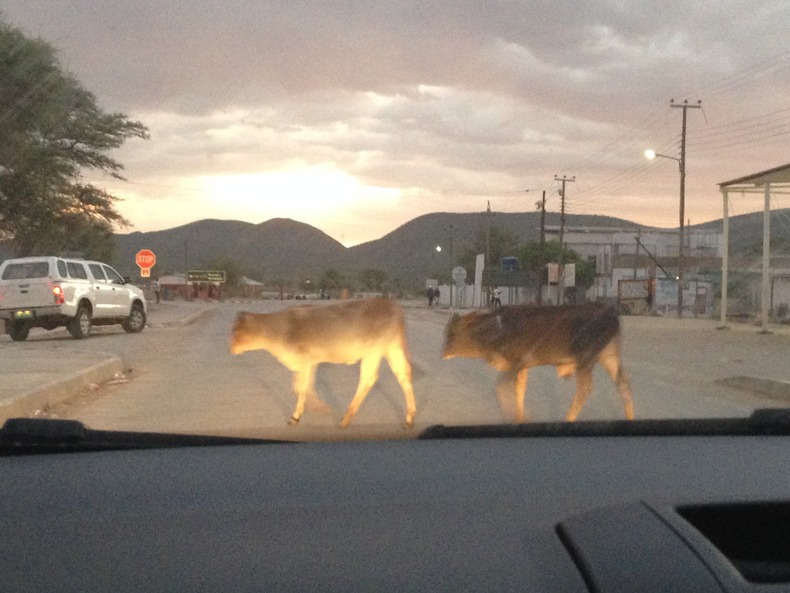-A photo taken in the commerce area of town, a true mix of the traditional and modern
Social Workers Know Everything
On Tuesday and Wednesday I met with a particularly inspiring Social Worker--I will refer to him as Sam--who works for one of the Ministries and I also met with about 8 members of the Vita Royal House Traditional Authority.
Sam explained some of the reasons why people prefer to decide rape cases under customary law instead of reporting to the police. He also told me that in pretty much every case that is withdrawn or cannot continue because people refuse to testify, the reason is because people decide to resolve the case through the customary compensation system instead of through the criminal justice system. There is only one case in the entire area that is being followed through with by the state (the other four reported cases seem to not have enough evidence due to people changing their testimony etc but could potentially still be prosecuted).
“...they don’t want the criminal case, it’s seen more as a community [issue]. Regardless of...if I abuse someone...I still belong to the community. Regardless of the victim’s side I must not go to jail. I’m still part of the community, We are still one. So just compensate us and life goes on. You don’t have to go to jail. The issue of punishment in terms of criminal procedures, they do not want that.”
“It’s a culture that is more like cohesion, its more like solidarity in terms of doing the wrong thing...Its a funny concept of solidarity that we have, even [when] there is something worthy of being reported.”
-Sam, Social Worker
This idea of one-ness above (all?) else is consistent with what others have explained to me more subtlety. As a result of the prioritization of group cohesion and avoidance of involving the police, only cases where outsiders are the perpetrators are reported. The one case that was reported and is being followed through with is an exception to the norm and this case was only reported because a "do-gooder" teacher of the victim (a minor) reported it. The mother and the family of the victim not only failed to report it but tried to convince the victim not to report, and then tried to have the case withdrawn so that compensation could be received instead. However, for minors, cases cannot be withdrawn. The family is now very upset with the victim for reporting.
Decision-making authority for women??
Some people I interviewed told me that the victim is involved in the decision-making process whether to report to the police or receive compensation. Others told me the opposite. Sam told me that families often try to persuade the victim that not reporting is the right thing to do (like the case mentioned above). “You are going to be compensated and we can’t let this person go to jail. It’s a relative, we can’t let this person go to jail.” Sometimes this situation results in child marriage.
The Vita Royal House TA also explained the victim’s role in deciding whether to accept compensation or report to the police. “So most of the time, the victim demands what they want to be compensated. Then it is sometimes overruled by their family [considering] the circumstances, how the people are related and also thinking about the future. Whether you might cause harm to the other family and they might take revenge. Or make you pay more if it may be one from our family who wronged another. They take this into account and put up a figure that is reasonable to both families.”
So the victim has a say, but the family/head of household seems to have the final say. The family is also concerned about (1) what will happen if someone in the family commits a crime later and (2) what the perpetrator's family will do if they report the case to the police or demand too much compensation (i.e. revenge including witchcraft).
The Vita Royal House TA also told me something else interesting. Regardless of your age, traditionally it is inappropriate to discuss your own case to those outside your family. Your family represent you in a compensation case or other matters and then consult you and speak to the other family. This might be changing in modern times, but this avoidance of discussing one's own case certainly has an impact in how much say a victim has over their own a compensation case and whether or not to report/withdraw.
“So witchcraft in the case of withdrawals, it's a big issue.”
Sam and the prosecutor I met later that week told me specifically and others suggested that there is a very real fear of witchcraft in the area. I later learned that one reason people may be afraid to talk about witchcraft directly is because there is still a Witchcraft Suppression Act in effect in Namibia, which was implemented under the colonial government. Under this law, it is not only illegal to perform witchcraft but it is also illegal to discuss or even report witchcraft performed by others. In practice, this is not used much today (if ever) but people may still remember a time when they could get in trouble for uttering the word witchcraft.
It's hard to combat a fear in something fictional--to many witchcraft is very real and reporting a crime is not worth the risk of such revenge. This is difficult to address since it is pretty much impossible to reason your way through something supernatural, in this case to convince people to report cases. For example, everyone has heard of a criminal case (for murder) where there were supposedly six witnesses and five died within one year before the case could be completed. The sixth witness supposedly ended up in a wheelchair. Of course there is no such thing as witchcraft and it's not clear whether these witnesses actually died or what caused their deaths if there is any truth to this story whatsoever. But the veracity of the story doesn't matter because people believe it to be true. People believe that witchcraft was used to kill off or injure all these witnesses and this terrifies them. It terrifies them enough to convince them not to report crimes, to withdraw reported cases, or to change their testimony against a perpetrator.
Cows crossing the main street in Opuwo in front of our car, do not hit them or you will be in big trouble
It's not a great grocer, it's not a bad grocer. It's just an OK Grocer. We thought this was hilarious.
Living in the world. Humanitarian. Advocate for health, human rights and equality. Documenting experiences and observations.



